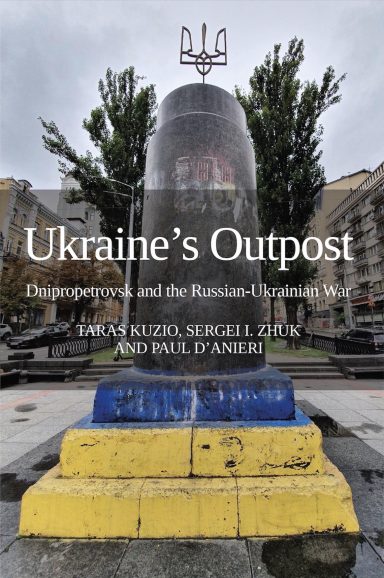This is the first book to analyse the Russian-Ukrainian war considering the role played by the Dnipropetrovsk region as the country’s forpost (outpost) in Russia’s war against Ukraine. In the Soviet Union, Dnipropetrovsk was a closed city due to its large military industrial complex, and it was the world’s biggest producer of nuclear missiles. This book analyses how a city that was once the pride of Soviet power became a bastion of Ukrainian patriotism in the face of Russian military aggression in 2014 and thereafter. Led by Jewish-Ukrainian Russian speakers, the city of Dnipro and the region of Dnipropetrovsk prevented the spread of the Kremlin’s so-called ‘New Russia’ project beyond the Donbas into the heart of Ukraine. This book challenges disinformation and stereotypes which portray Ukraine as a regionally divided country with the military conflict as a ‘civil war’ between Russian and Ukrainian speakers.
Ukraine’s Outpost: Dnipropetrovsk and the Russian-Ukrainian War
Table of contents
Introduction
– Paul D’Anieri
Communist Party Politics, Rockets and Komsomol Business in Soviet Dnipropetrovsk
– Sergei I. Zhuk
‘Eastern Ukraine’ Is No More: War and Identity in Post- Euromaidan Dnipropetrovsk
– Taras Kuzio
The Revival of The Dnipropetrovsk and Dnipro Jewish Community in Ukraine
– Olena Ishchenko
Memory Politics in Dnipropetrovsk, 1991–2015
– Oleh Repan
The Outpost of Ukraine: The Role of Dnipro in the War in the Donbas
– Nicholas Kyle Kupensky and Olena Andriushchenko
Decommunisation In Dnipropetrovsk and Dnipro in 2014–2019
– Ihor Kocherhin
Do National and Geopolitical Identities Explain Attitudes to Decommunisation? A Comparison of Dnipro and Kharkiv
– Oleksiy Musiyezdov
IDPs and the Media: What Shapes the Narratives on Internally Displaced People in Dnipro Media?
– Kostyantyn Mezentsev And Eugenia Kuznetsova
